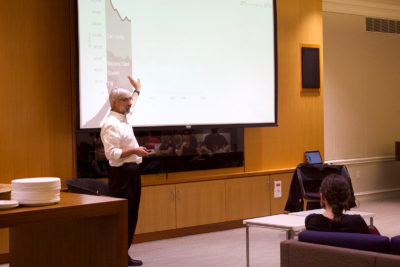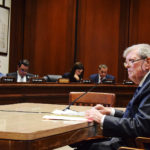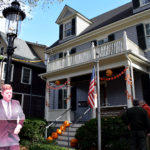
The Boston University Climate Action Task Force hosted a forum to get input from the BU community about how to improve its Climate Action Plan, which is intended to reduce greenhouse gas emissions and create a more sustainable campus.
About 60 members of the community gathered Thursday evening at the Kilachand Honors College to present feedback on the plan and to hear from others. Anthony Janetos, a professor of earth and environment and the chair of the Climate Action Task Force, as well as Dennis Carlberg, BU’s director of sustainability, spoke on behalf of the Task Force.
The goal of Thursday’s forum, Janetos said, was to ensure the opinions and perspectives of BU community members were represented in the final draft of the plan.
“This is not just a set of recommendations for how the university operates its facilities,” Janetos said. “What we’re proposing is a fundamental change to the university’s culture. We’re all members of this community — faculty, students, staff — and so it’s always important to hear those views.”
The action plan has been in the works since last November and will be presented to the Board of Trustees in December, according to Janetos.
The finalized plan will be presented to the Board in hopes that it will make the university more environmentally sustainable, according to Janetos, putting BU at the forefront of energy-efficient bodies in Boston.
“One of the reasons for us to select these ambitious goals is because they’re ambitious,” Janetos said during the forum. “We think they’re doable and feasible, but they also provide a very powerful example to the other big institutions in Boston, including the city, about what you can actually achieve.”
Rachel Schlueter, a senior in the College of Arts and Sciences, who helped organize the forum, said she wanted to familiarize herself with the Task Force’s work to be a more informed member of the university community.
“I wanted to have a productive discourse with peers but found it difficult to understand the content of the [CAP] well enough to provide input,” Schlueter wrote in a message before the forum. “[The forum] is an exciting opportunity to gain a technical understanding of the CAP and hear the justifications behind those actions.”
Some of the recommendations that the plan presents include transitioning the university’s electrical load to 100 percent renewable energy, according to Carlberg.
“We’ve made about a 25 percent cut in our emissions in the past decade,” Carlberg said during the forum. “The Climate Action Plan is addressing this much more robustly.”
Several students at the forum said they were happy with the plan, but they wanted to see the university go even further in its sustainability efforts.
Qian Mei, a senior in the College of Fine Arts, said she likes the action plan and is curious to see how it will be put into effect in the end.
“The plan in all theoretical ideal terms is pretty sound, but I think it’s all down to the logistics and the details of how they implement it,” Mei said. “I feel like one of the big issues right now is that BU is invested in large oil companies to increase our profits.”
Cameron Hill, a sophomore in the Sargent College of Rehabilitation and Health Sciences, said he sees BU as a leader for other institutions’ involvement in climate action.
“[Janetos and Carlburg] emphasized that they really want to be a leader here in Boston,” Hill said, “so to be ahead of the City of Boston in their timeline is a really key element in this and I really want to see where this goes long term.”
Michael Grinshpun, a CAS sophomore, said he likes the fact that the Task Force is seeking student feedback, but that he also wants to see the university be more aggressive in its clean energy goals.
“The best way to get this kind of significant position is to get feedback from the students and [Janetos and Carlberg] were really emphasizing that,” Grinshpun said. “I think that it’s really good that the university’s doing a purchasing plan agreement to buy renewable energy for their electricity purposes, but I think they can go further and actually generate their own energy.”




